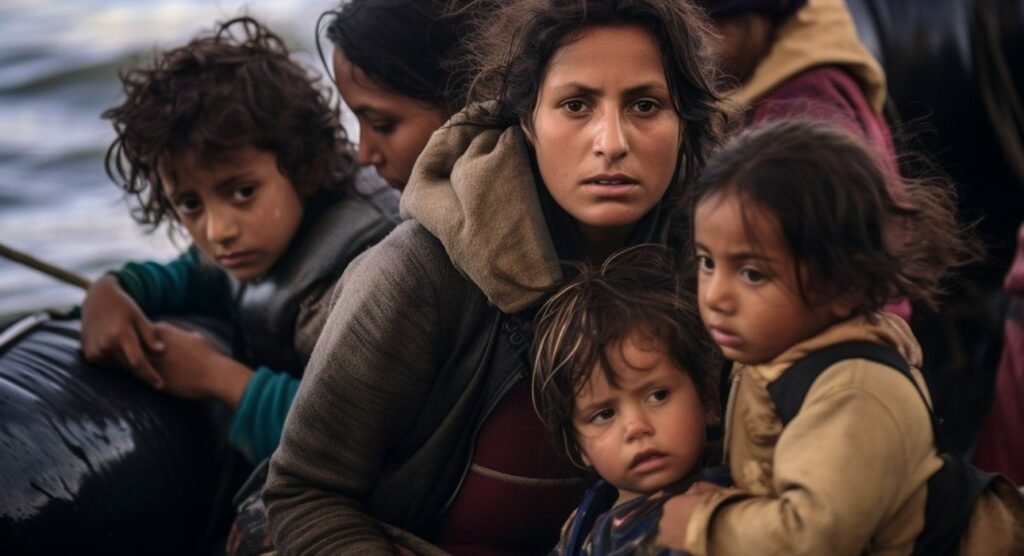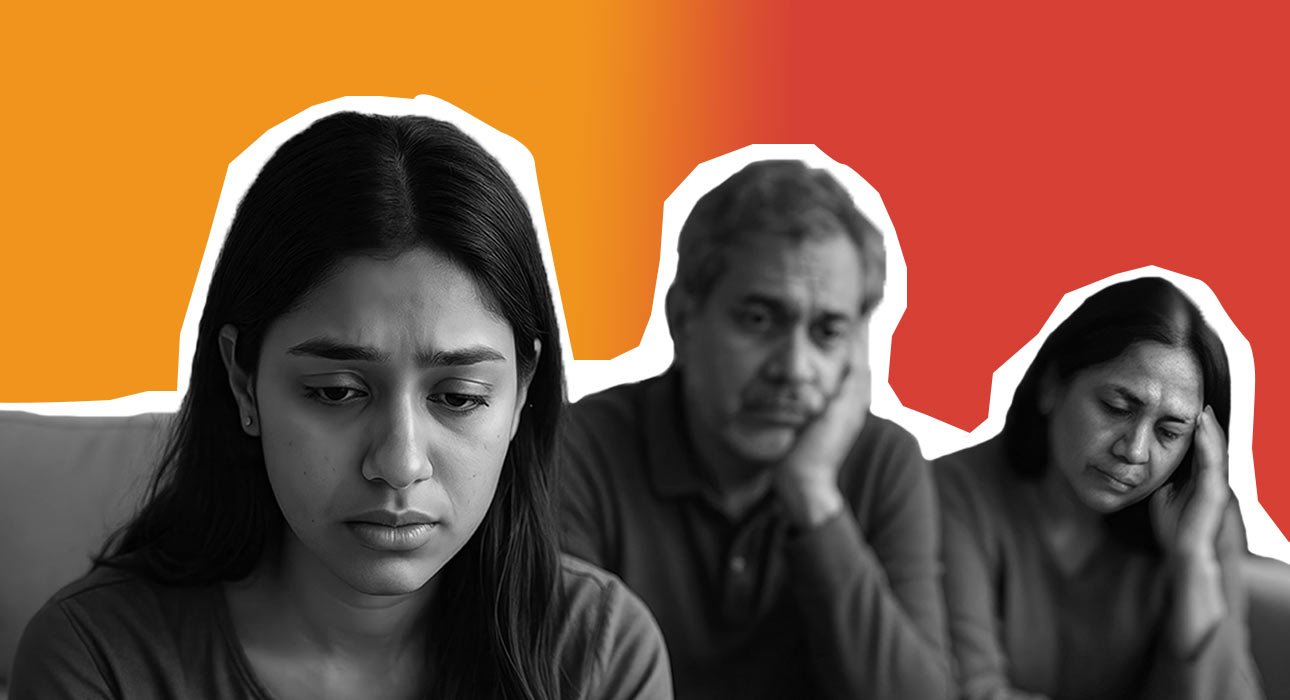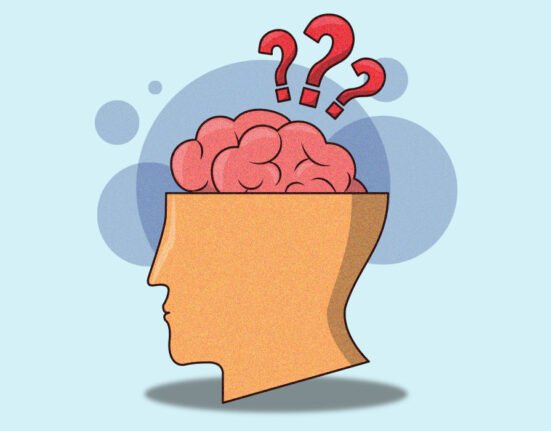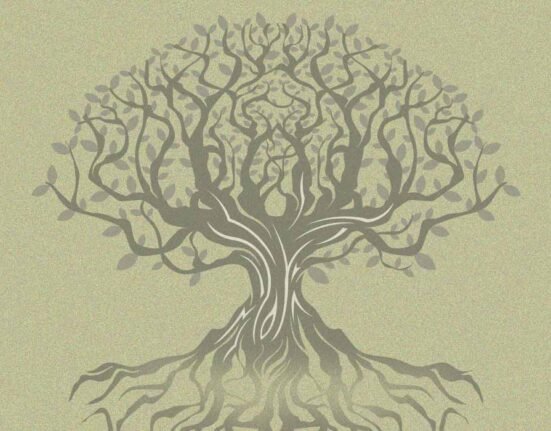History suggests that once the atrocity is over, it ceases to exist. Colonisation, slavery, cultural erasure and other acts aimed toward marginalised groups across the world only seem to impact the groups when they are being acted upon. History does not make space for the burden of systemic discrimination, atrocities, injustice, and pain that emanate from these experiences and are interwoven into the identity of the victim group.
These scars of deep trauma are not only experienced by the victims but slowly trickle down through generations. Such trauma lives on, not just in physical bodies but across generations, shaping mental health decades after the first infliction of pain.
Read More: How Does Trauma Affect Brain Function?
What is Intergenerational Trauma?
Also known as ‘Transgenerational Trauma’, this type of trauma forms an agonising legacy of the original inflicted pain. It is the trauma experienced by subsequent generations without direct exposure to the original event (Cacace & Summers, 2025). The study of such phenomena emerged in literature through the experiences of the generation born to Holocaust survivors (Yehuda & Lehrner, 2018).
The transmission of this form of trauma manifests as psychological consequences of pain that might have been inflicted upon an individual’s predecessors ages ago (APA Dictionary of Psychology, n.d.). Literature aims to understand how such experiences and their effects are transferred from generation to generation, allowing even those who have never witnessed such atrocities to carry the psychological burden of them. A few of the transmission mechanisms suggested by research are:
Read More: Encanto, Bruno And Intergenerational Trauma
1. Genetic Alteration
The transference of trauma is believed to have an epigenetic basis, suggesting that trauma can inherently alter a gene and its expression (Rando, 2016). Literature also suggests that offspring are affected by parental trauma even before birth and possibly before their conception because of the impact of trauma on genetic markers and carriers (Yehuda & Lehrner, 2018). A common example is the alteration of the body’s stress response, which changes predisposition to anxiety, depression and more as a result of altered DNA linked with intergenerational trauma (Jiang et al., 2019).
2. Psychological Mechanisms

Several basic mechanisms allow for the transmission of trauma across multiple generations and can be assumed to have a mediating role in allowing such cycles to pervade. The attachment formed between parents and children is considered one of the negative experiences that can affect a generation and have an impact on the subsequent generation as well (Gravener et al., 2011). Simultaneously, the presence of unresolved trauma will impact family dynamics, parenting styles, behaviours and allow for the perpetuation of negative core beliefs, fundamentally impacting future generations.
Read More: Cultural Trauma: How communities hold grief across generations
3. Social Factors
Historical notes indicate that the social implications of traumatic events also manifest as socio-economic factors. This suggests that issues such as poverty, discrimination and oppression, which arise as a result of events of the past, will continue to have an impact on the present as well. Simultaneously, cultural factors such as loss of identity and tradition will also play a significant role in the perpetuation of intergenerational trauma (Bowe et al., 2025).
Foundation of Trauma in Minority Communities
Adverse childhood experiences, abuse, oppression, and more can lead to the formation of trauma in an individual. However, history is proof that minority groups are almost always more likely to be victims of such traumatic events (Roberts et al., 2010). The intersection of a variety of events, ranging from colonisation to cultural erasure and loss of cultural identity, allows minority communities to experience a higher risk and greater intensity of generational trauma.
Read More: Why Mental Health Care Still Doesn’t Reach Rural Minority Communities
1. Chronic Oppression

Minority groups are more likely to be victims of chronic oppression and systemic discrimination, which can be found in multiple facets of their lives. These negative experiences can lead to constant stress, impaired self-view view and the disruption of psychological well-being, all of which can persist into future generations and result in a range of challenges (Williams et al., 2023).
2. Loss of Culture
Culture provides a sense of belonging and shapes an individual’s identity. However, the loss of culture along with its practices, traditions and values can lead to an individual feeling lost and without connection. The integrative nature of culture with social structures and community suggests why the loss of culture will lead to lower social cohesion and create community mental health challenges, further worsening well-being. To escape the trauma being inflicted upon them, minority groups will often aviator on cultural identities and begin to adopt those of the majority, which not only leads to cultural erasure but also becomes a form of trauma in itself (Ford et al., 2015).
3. Historical Silencing
It is commonly believed that history is written by those who are the victors of the various wars that have been fought across civilisation. Historical texts do not account for those members of the LGBTQ+ community who have been excluded or suppressed from mainstream discourse. The underrepresentation of minority groups in history, along with the belief that they must not speak of their experiences, can lead to internalised shame and disrupted identity (Mohatt et al., 2014).
The experiences of minority groups have been thwarted by social injustices across history, especially in India. Colonisation, caste-based discrimination, the partition, religious discrimination, stigmatisation of certain groups, and other events that form the history of the country form the historical roots of inter-generational trauma in minority communities.
Read More: Cultural Mourning: The Hidden Psychological Impact of Losing Heritage
How Trauma from the Past Moulds Mental Health in the Present?
The pervasive nature of intergenerational trauma allows it to have a profound impact on mental health in those individuals who exist long after the event that initially caused the trauma. It also tends to go unrecognised, silenced and unaddressed, allowing its roots to spread over every aspect of one’s life. The earliest accounts of intergenerational trauma also suggested that it almost seemed like the impact of the trauma skipped the survivors of the events and was directly passed down to their children, manifesting as behavioural and emotional problems (Rakoff, 1966).
Read More: Behavioural problems in School-aged children: A Psychoeducational Perspective
1. Increased likelihood of developing Mental Health Disorders
Intergenerational Trauma leads to a heightened vulnerability to mental health disorders. Ullah et al. (2023) suggest that it is a silent contributor to the deterioration of overall mental well-being and health. Not only does it lead to the manifestation of disorders like depression, anxiety, and post-traumatic stress disorder (Raypole, 2022), but it has also been linked with neurodevelopmental disorders (Alhassen et al., 2021).
Read More: Childhood Fears and Their Relation to Mental Health Disorders
2. Hypervigilance and Increased Stress Response
Epigenetic alterations at the hands of transmission of trauma across generations have systematically altered an individual’s stress response at a DNA and molecular level (Jiang et al., 2019). It can manifest as a form of heightened state of alertness or hypervigilance, creating a tendency to be on guard. This maladaptive stress response can also be linked to a greater proclivity to anxiety disorders and phobias (Cacace & Summers, 2025). This response may mirror the emotional landscape of the ancestor’s experience of the traumatic event.
3. Maladaptive Attachments and Parenting Styles

Intergenerational trauma leads to emotional dysregulation and will disrupt an individual’s ability to emotionally bond with others, allowing maladaptive attachment styles and parenting behaviours to arise. Especially in the case of minority groups who often face ongoing oppression, they direct most of their efforts towards ensuring the safety of their loved ones rather than creating healthy, emotional connections with them. These patterns of survival are learnt by the children, allowing feelings of insecurity, fear, and even confusion about emotional expression to arise. (Kostova & Matanova, 2024)
Read More: How Does a Child Develop Attachment Style?
4. Loss of Identity
The very nature of intergenerational trauma in minority groups ties the experience with aspects of one’s identity, such as race, caste, culture, or even religion. When such a negative experience closely integrates with one’s identity, an individual finds it very difficult to keep aligning with that identity. Individuals may begin to adopt different attitudes, behaviours, and presenting indicators which will differentiate them from the identity of the minority group, allowing them to escape continued oppression as well as traumatic experiences (Ullah et al., 2023).
5. Substance Use and Other Coping Mechanisms
While it is inaccurate to believe that substance use and other maladaptive coping mechanisms are inherently more likely to exist in individuals from minority groups, research suggests that various socioeconomic factors can increase the risk for the same. Various factors such as poverty, lack of access to healthcare, experiences of oppression, racism and other social evils can increase the likelihood of substance use (Cook & Alegría, 2011). Families learn and pass down these coping mechanisms across multiple generations, allowing them to persist even when the socioeconomic disparities faced by the minority group no longer exist (Jones et al., 2023).
A Way Ahead
Intergenerational trauma is a presence that continues to shape mental health relationships and even identities of individuals and communities, particularly within minority populations, long after the traumatic event has ended. Histories of injustice, violence, oppression, and more silently transmit this trauma through various behaviours, patterns, family dynamics, and even genetics. It is a form of trauma that is so pervasive that it can impact all facets of an individual’s life, yet remains overlooked in mainstream discourse and clinical practice.
However, with the consistent efforts of Psychology today, individuals can aim to actively break this cycle of intergenerational trauma. With the rise of culturally sensitive, therapeutic models, community-based interventions, trauma-informed care and more, communities can process the pain they have inherited from their ancestors, reclaim their narratives and begin healing. With resilience, victims of intergenerational trauma work towards recovery and aim to build a future where the wounds of their past no longer dictate their mental well-being.
Read More: Power of Self-Care in Trauma Recovery
FAQs
1. Can a family pass on intergenerational trauma even if they don’t discuss the traumatic event?
The mechanisms that transfer intergenerational trauma related to minority groups across generations go beyond simply talking about it. Research shows that intergenerational trauma causes epigenetic changes, which manifest as irregular stress responses. The trauma will impact emotional bonds, parent-child relationships, identity, and even the approach an individual has towards their own community. These experiences have a fundamentally larger impact on the younger generation, allowing intergenerational trauma to persist. However, we must note that avoiding conversations about traumatic events can allow intergenerational trauma to persist. This becomes especially true when those events connect to an individual’s minority group identity.
2. How do I know if my struggles are related to Intergenerational Trauma and not my own experiences?
For an individual dealing with the aftermath of any type of trauma. It can be very difficult to understand what is impacting them. This is especially true in the case of intergenerational trauma. Such trauma exists in all aspects of an individual’s life, making it hard to understand its extent. However, if an individual feels that their emotional patterns are disproportionate to their personal experiences, it may be a sign. This is particularly relevant when their minority group identity shapes the situation. Therapy can help identify these links.
3. Can the experiences of Minority Groups and their trauma help an individual from the group feel empowered?
Yes, in a lot of cases, the painful history of minority groups can actually help an individual with the same identity feel empowered. This is possible as long as they take efforts to rewrite the narrative. Doing so requires a lot of resilience and strength. Both the individual and the community need to work together to fundamentally change the perspective they adopt towards their history.
4. Are there any cultural practices that can help prevent intergenerational trauma?
To mitigate the impacts of traumatic events in the past related to a minority identity, the individuals of the group can take specific efforts. These efforts help prevent intergenerational trauma. They are often cultural or community-specific. They may take the form of art, storytelling, music, spirituality, rituals, or even collective mourning and celebration.
References +
Alhassen, S., Chen, S., Alhassen, L., Phan, A., Khoudari, M., De Silva, A., Barhoosh, H., Wang, Z., Parrocha, C., Shapiro, E., Henrich, C., Wang, Z., Mutesa, L., Baldi, P., Abbott, G. W., & Alachkar, A. (2021). Intergenerational trauma transmission is associated with brain metabotranscriptome remodeling and mitochondrial dysfunction. Communications Biology, 4(1). https://doi.org/10.1038/s42003-021-02255-2
APA Dictionary of Psychology. (n.d.-a). https://dictionary.apa.org/intergenerational-trauma
APA Dictionary of Psychology. (n.d.-b). https://dictionary.apa.org/intergenerational-trauma
Bowe, C., Thomas, C., & Mackey, P. (2025). Perspective to Practice: Theoretical Frameworks Explaining Intergenerational Trauma, Violence, and Maltreatment and Implications for the Therapeutic Response. International Journal of Environmental Research and Public Health, 22(3), 321. https://doi.org/10.3390/ijerph22030321
Cacace, A., & Summers, S. J. (2025). Intergenerational Trauma in Phenomenological Research—A Systematic Review. Journal of Loss and Trauma, 1–36. https://doi.org/10.1080/15325024.2025.2490917
Cook, B. L., & Alegría, M. (2011). Racial-Ethnic Disparities in Substance Abuse Treatment: The Role of Criminal History and Socioeconomic Status. Psychiatric Services, 62(11). https://doi.org/10.1176/appi.ps.62.11.1273
Ford, J. D., Grasso, D. J., Elhai, J. D., & Courtois, C. A. (2015). Social, cultural, and other diversity issues in the traumatic stress field. In Elsevier eBooks (pp. 503–546). https://doi.org/10.1016/b978-0-12-801288-8.00011-x
Gravener, J. A., Rogosch, F. A., Oshri, A., Narayan, A. J., Cicchetti, D., & Toth, S. L. (2011). The Relations among Maternal Depressive Disorder, Maternal Expressed Emotion, and Toddler Behaviour Problems and Attachment. Journal of Abnormal Child Psychology, 40(5), 803–813. https://doi.org/10.1007/s10802-011-9598-z
Jiang, S., Postovit, L., Cattaneo, A., Binder, E. B., & Aitchison, K. J. (2019). Epigenetic Modifications in Stress Response Genes Associated With Childhood Trauma. Frontiers in Psychiatry, 10. https://doi.org/10.3389/fpsyt.2019.00808
Jones, A. A., Duncan, M. S., Perez-Brumer, A., Connell, C. M., Burrows, W. B., & Oser, C. B. (2023). Impacts of intergenerational substance use and trauma among black women involved in the criminal justice system: A longitudinal analysis. Journal of Substance Use and Addiction Treatment, 153, 208952. https://doi.org/10.1016/j.josat.2023.208952
Kostova, Z., & Matanova, V. L. (2024). Transgenerational trauma and attachment. Frontiers in Psychology, 15. https://doi.org/10.3389/fpsyg.2024.1362561
Mohatt, N. V., Thompson, A. B., Thai, N. D., & Tebes, J. K. (2014). Historical trauma as public narrative: A conceptual review of how history impacts present-day health. Social Science & Medicine, 106, 128–136. https://doi.org/10.1016/j.socscimed.2014.01.043
Rando, O. J. (2016). Intergenerational Transfer of Epigenetic Information in Sperm. Cold Spring Harbor Perspectives in Medicine, 6(5), a022988. https://doi.org/10.1101/cshperspect.a022988
Raypole, C. (2022, April 20). Understanding Intergenerational Trauma and Its Effects. Healthline. https://www.healthline.com/health/mental-health/intergenerational-trauma#signs-and-symptoms
Roberts, A. L., Gilman, S. E., Breslau, J., Breslau, N., & Koenen, K. C. (2010). Race/ethnic differences in exposure to traumatic events, development of post-traumatic stress disorder, and treatment-seeking for post-traumatic stress disorder in the United States. Psychological Medicine, 41(1), 71–83. https://doi.org/10.1017/s0033291710000401
Ullah, H., Ahmed, H., Tharwani, Z. H., Shaeen, S. K., Rahmat, Z. S., & Essar, M. Y. (2023). Intergenerational trauma: A silent contributor to mental health deterioration in Afghanistan. Brain and Behaviour, 13(4). https://doi.org/10.1002/brb3.2905
Williams, M., Osman, M., & Hyon, C. (2023). Understanding the Psychological Impact of Oppression Using the Trauma Symptoms of Discrimination Scale. Chronic Stress, https://doi.org/10.1177/24705470221149511
Yehuda, R., & Lehrner, A. (2018). Intergenerational transmission of trauma effects: putative role of epigenetic mechanisms. World Psychiatry, 17(3), 243–257. https://doi.org/10.1002/wps.20568













Leave feedback about this